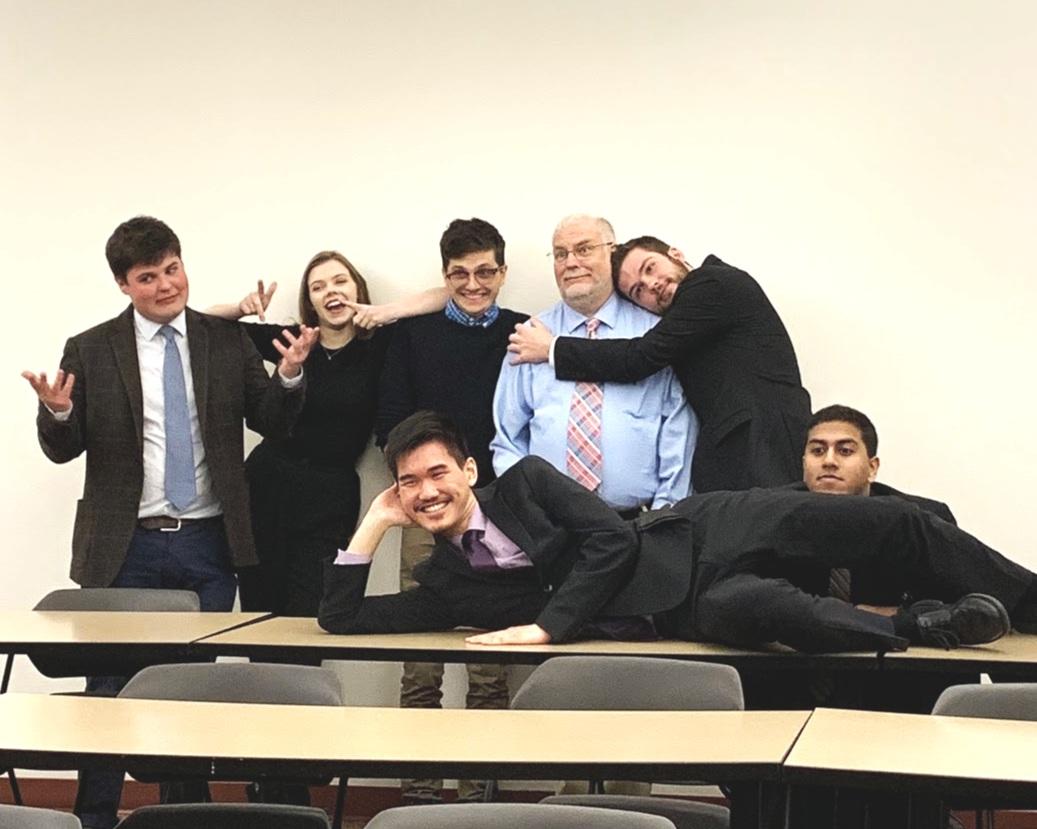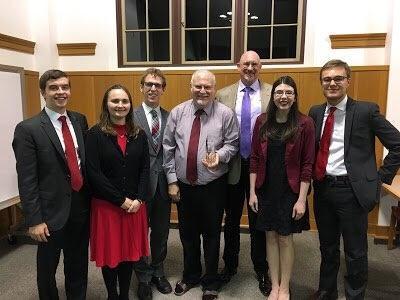They occupy Whitworth’s original building from 1914. They bake cookies and sing songs with Ballard on Wednesdays. And diners can be sure to spot them when they stroll into the HUB for dinner at 5:05 p.m. each day. McMillan is home to a unique, all-male community that prides itself on its traditions and close relationships. However, this year has seen some changes in traditions for “Mac” that have received both positive and negative responses from residents.
The first major change occurred at the start of the year with the updates to the Milk & Cookies tradition, which is a weekly event started by BMac several years ago by a couple residing in Ballard and McMillan. Ballard residents would bake cookies and bring them to McMillan, where they would be thanked with a song, and then enjoy the treats together. However, many found that the event did not line up with modern gender role ideals, including junior Joshua Worden.
“It also made a problem for Res-Life, who had drifted steadily into a position where, even though they didn’t organize or pay for Milk & Cookies, they did sort of promote and sanction it,” he said. “At the beginning of the year, at the second Milk and Cookies, they decided they would seize the reins of the event and make some changes, without community input. They turned it into a mixed-gender event, where both dorms participated in both the baking and eating of the cookies. They changed the lyrics of the song, which used language that was male-specific and Mac-specific. They took a Sharpie to the poster and scribbled over the old lyrics, then shoddily pasted their replacements on top with brown paper and blue tape.”
Worden says this prompted outcry from the community despite the hall’s general agreement that it needed a more inclusive update because many felt that residence life did not have legitimate ownership of the event.
“It was such a big deal that no one in either hall talked about anything else for weeks,” Worden said. “Meg Lechner, the RD, wrote a formal letter of apology, and convened a bunch of town hall meetings…This didn’t really placate residents; it couldn’t have been more obvious that the minds of Residence Life were made up.”
Junior James Parrish, who has lived in McMillan for all of his time at Whitworth and now serves as the senator, weighed in.“The idea was to bring the BMac community closer together,” he said. “With that said, and we have all admitted this, leadership did not go about the change in the right way where we did not consult the residents…Since then, we have done our best to consult residents more, get their opinions on what things are going on. Any changes that we want to make, we’ve tried to talk to residents, at least get a handful of people, see what’s their opinion on this, is this a feasible change or adaptation.”
RA sophomore John Haberlin also explained the intentions behind the sudden changes. “There are three parts to my job,” he said. “Part one is making sure that there’s safety in the hall and that all residents feel safe, welcomed, and included…The second is that we are supposed to develop community and help establish community between the residents…The third thing is that we are developing these residents as adults for the future. Some of the earlier changes that we made were for safety reasons, and when we are looking at changing something for safety reasons, some of the changes can be a little more abrupt because we are not looking so much for community input just because we have to meet certain safety standards and some of the traditions were a little outdated.”
The next area of contention occurred when “Mac Birthdays” were removed and replaced by BMac Birthdays. This tradition used to be something that individuals could sign up for in order to receive a shirtless serenade at midnight on the night of their birthday. Now, the tradition is open to both Ballard and McMillan, people wear shirts, and they stand in a circle around the birthday person with a candle.
Junior Chad Ross, who has lived in McMillan since his freshman year, does not favor the new changes because, while it used to attract roughly 10-25 residents, it has declined in popularity since.
“It is not well-accepted because the implementation of the BMac birthdays has not been very consistent,” he said. “It is now celebrated at random times, and lately there has been no celebration of birthdays. Less people are signed up and excited about it. [The leadership team] meant to replace them but just got rid of the celebration for the most part.”
Worden and Ross both reported a meeting taking place after the first Mac Birthday at the start of the year. “Without any warning, all of the participants were written up, and required to attend a conduct meeting with Tim Caldwell,” Worden said. “This meeting struck pretty much everybody as a transparent show of force from Residence Life, firstly because, as strange as this event was, it violated no policies in the Whitworth Student Handbook…Accordingly, and despite much ado, no one was fined, because they couldn’t be, because they had violated no policies. The other thing that made it seem like an obvious scare-tactic is that Res-Life held two meetings, and explicitly separated the freshmen from the upperclassmen.”
Assistant Dean of Residence Life Tim Caldwell could not comment on any meeting with specific individuals, but expressed his enthusiasm for the idea of celebrating people on their special days. “I am also aware of how this tradition could violate certain portions of the student handbook based on the actions of the individual(s) participating, and how these actions could be perceived by others in the community. Because of these concerns I asked the leadership to consider altering the tradition in a way that would still keep the foundation…while also protecting the community from issues of hazing and sexual misconduct which are outlined in the student handbook. To my surprise the leadership also altered the tradition to include Residence Life’s desire to be radically inclusive of all its members and combined the birthday celebration for both Mac and Ballard halls.”
Haberlin also echoed a similar argument for these changes, saying that Title IX violation had to be avoided and that the safe, welcoming environment of the community needed to be inclusive.
A third change has been in the “manarchy” tradition of McMillan’s default to 24-hour consideration rather than to organized quiet hours, a popular rule among the residents as a form of conflict-management. At the Spring CBS meeting in February, the leadership team voted for traditional quiet hours policy and, with little resident participation, it went through. It was later debated and “manarchy” was reinstated at the ratification meeting, which was held on a weekend and saw more participation.
A final and most recent change was described by Ross as a disengagement of the leadership team from the famous cup-stacking dinner tradition. He had noticed in recent weeks that the RAs seemed to be sitting at a separate table. Haberlin said, “It’s an opt-in culture, so you can say yes to what you want to, and you can say no to what you want to…and as RA’s, we are also residents and can opt out if we want to…and that is a healthy, growing community.”
Overall, the unrest in the community appears to be less from the changes themselves and more from perceived leadership actions.
“Whitworth is a private institution,” said Worden. “It’s under no obligation to listen to its residents, it has every right to set whatever rules it pleases. Why, then, do they bother to act like they’re listening when it’s so obvious that their priorities are their own? I like co-ed Milk & Cookies, I never wanted a Mac-Birthday, and ‘manarchy’ pulled through in the end, but none of that tempers my weak tolerance for the basic hypocrisy of claiming to listen while covering your ears.”
The RD of BMac, Meghan Lechner, recognizes some of these community responses and offered her own thoughts on the changes. “While the buildings of Ballard and McMillan are physically separated by a sidewalk, BMac is very much one,” she said. “The adjustments made to events like Milk & Cookies and BMac Birthdays were made to honor the inclusive spirit of these traditions and to strengthen the sister/brotherhood bond of this community…As the only gendered residence halls on campus, I feel we also have a unique opportunity to create an educational and safe space for students to ask questions and explore the role that gender plays in their life and how this layer of their identity will influence their transition into adulthood. The BMac Leadership team has been working hard this semester to create space for students to feel known in their gender identity and to ask critical questions of our residents as they consider who they are and who they want to be in this world.”
Ross offered up a statement of his appreciation for his community and an understanding view of leadership decisions. “Many members of the community see it as unique and different from the other dorm communities and that’s because we have long-standing traditions,” he said. “They have consistently brought us together in ways that we don’t see in other dorms, and we are all very well-connected to each other. We have many really good personal relationships with each other…so having those relationships built on the foundations of BMac and what it’s been, many members of the community can get upset when change does occur because they can see the negative consequences of those changes.”
It will remain to be seen whether Mac eventually reverts to its old ways or if new traditions take hold in the community, but a glimpse at the BMac tables at dinnertime reveals that the leadership and residents are as interconnected as ever.
Correction: In a previous version of this article, it was mistakenly published that McMillan was built in 1913, when in fact it was constructed in 1914.











